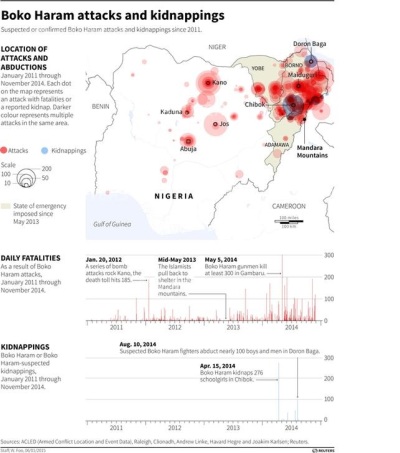2,000 slaughtered, town razed in Nigeria by Boko Haram

BAGA, Nigeria (Christian Examiner) – Perhaps 2,000 people in northwest Nigeria are feared dead, slaughtered the first weekend of January in what Amnesty International says is the worst atrocity yet by the Islamic terrorist group Boko Haram.
This is the group that roughly translated means "western-style education is forbidden" responsible for the kidnapping last April of 276 schoolgirls from their classrooms in Chibok. Its formal name, in English: People Committed to the Prophet's Teachings for Propagation and Jihad.
"The attack on Baga and surrounding towns looks as if it could be Boko Haram's deadliest act in a catalogue of increasingly heinous attacks carried out by the group," said Daniel Eyre, Nigeria researcher for Amnesty International, in a news report on the human rescue group's website: www.amnestyusa.org.
"If reports are true that the town was largely razed to the ground and that hundreds or even as many as 2,000 civilians were killed, this marks a disturbing and bloody escalation of book Haram's ongoing onslaught against the civilian population," Eyre continued. "We are currently working to find out more details of what happened. ... This attack reiterates the urgent need for Boko Haram to stop the senseless killing of civilians and for the Nigerian government to take measures to protect a population who live in constant fear of such attacks."
The area is still to volatile for government officials to see the extent of carnage, according to several news reports including that of Amnesty International.
Hundreds of gunmen invaded Baga, its military base and 16 surrounding villages Jan. 3 and for the next week without opposition continued to burn houses down and mercilessly kill people, often children and the elderly who couldn't escape fast enough, survivors said.
"We saw dead bodies especially on the islands of Lake Chad, where fishermen had settled," said Yahaya Takakumi, a 55-year-old farmer, according to a Jan. 12 account in Nigeria's Premium Times newspaper. "Several persons were killed there like insects."
Amnesty International's Nigeria spokesman Daniel Eyre explained that the Nigerian military quickly ran out of ammunition when Boko Haram descended on Baga. When the military retreated, they left area residents undefended.
"Almost everyone agrees that corruption has basically weakened the capacity of the military to operate," Eyre said. Low morale among the military and ineffective tactics add to the problem, Eyre added.
In addition to the dead, 30,000 people were displaced by the Boko Haram offensive.
"Boko Haram's videos show a troubling convergence between Nigerians militants and their ISIS counterparts not only in terms of symbolism and ideology, but also insurgency doctrine," wrote Peter Pham, director of the Atlantic Council's Africa Center, in an opinion piece posted on CNN.com's Global Public Square.
"Even more worrisome than Boko Haram's extremist ideology and gruesome terrorist acts should be the increasing military sophistication demonstrated by the Nigerian militants," Pham continued. "What makes the threat from Boko Haram all the more significant is the political and economic context of Nigeria, Africa's most populous country and the largest economy on the continent."
The international community needs to be involved with the protection of Nigeria's people, said Pham and others, such as Nigerian relations expert Adeniyi Ojutiku, a Southern Baptist, who spoke with Diana Chandler for a Jan. 12 article on the Baptist Press website, www.bpnews.net.
"This is no longer Nigeria's war," Ojutiku said. "Whatever the global community is doing with respect to ISIS ... they should be doing the same thing with respect to Boko Haram."
The Islamic terrorists, who first targeted Christians in an effort to establish Sharia law in Nigeria, can no long be considered a Nigerian and Christian problem, added Ojutiku, now living in North Carolina as founder of Lift Up Now, an organization designed to reform his homeland economically and spiritually, Chandler wrote.
"This is an escalation of the global Islamic agenda, and they have support, heavy support, training, equipment, material, from radical Islamic organizations," Ojutiku continued. "The local terrorism has been internationalized. "Now there is evidence that this very radical Islamic sect is now devouring their own moderate Muslims. Initially yes, Christians, but now they are more indiscriminate."